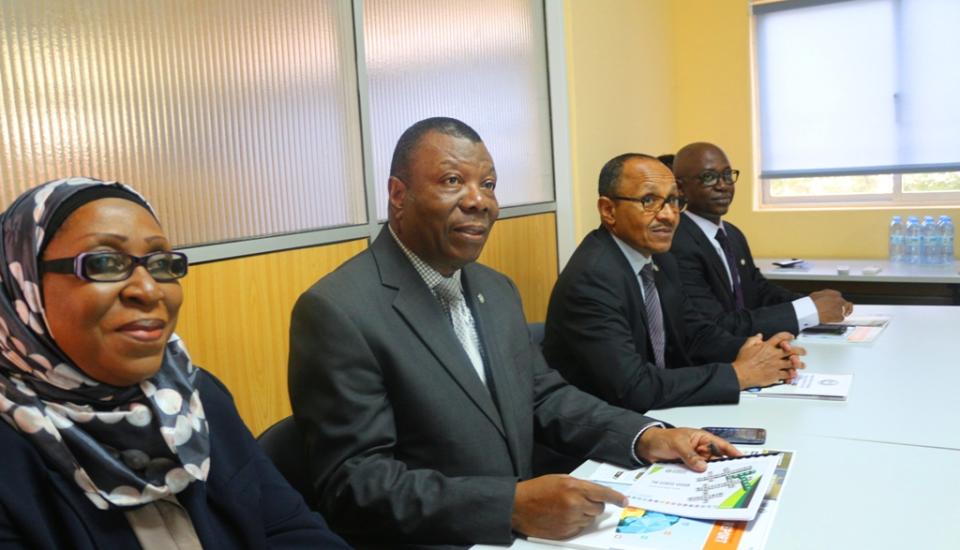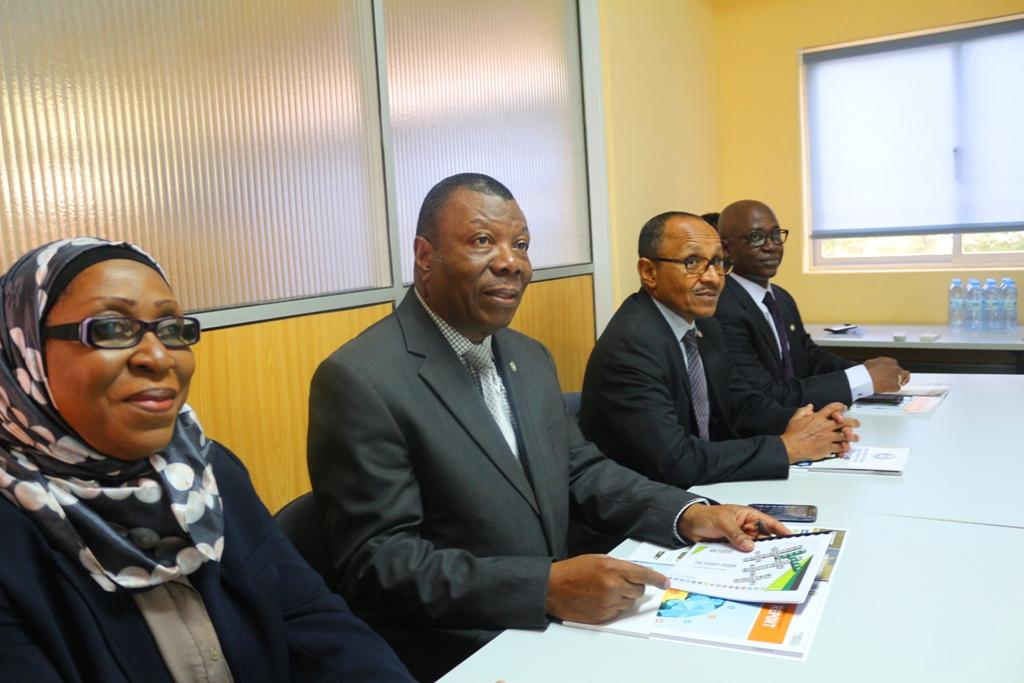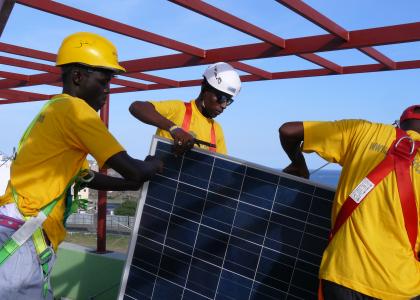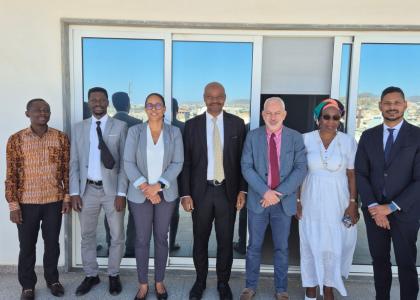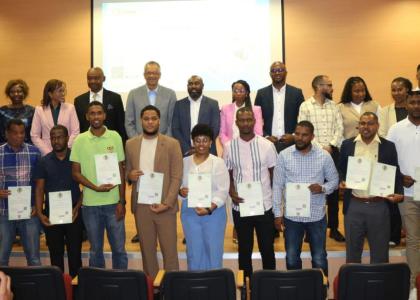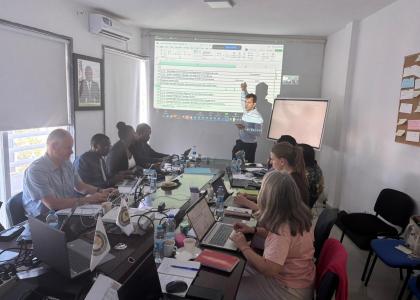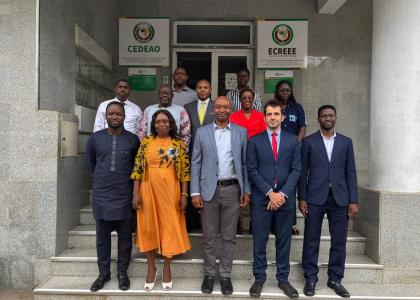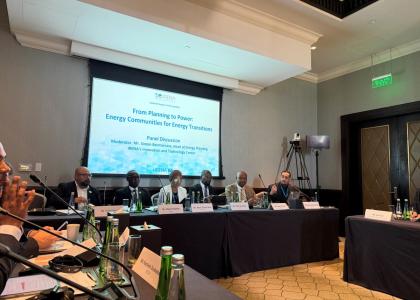Praia - June 24, 2015 – A high ranking ECOWAS delegation recently paid a working visit to the ECOWAS Centre for Renewable Energy and Energy Efficiency in Praia Cabo Verde. The five man technical delegation was led by the Vice President and chair of the committee of the ECOWAS Commission, Dr. Toga Gayewea McIntosh. Other members of delegation were Khadi Ramatu Saccoh, Commissioner for Administration and Finance; Hamid Ahmed, ECOWAS Commissioner for Trade, Industry, Customs and Free Movement, Dr. Muhammad Sani Bello ECOWAS Financial Controller, Mamadou Sidiki Traore, Chief Internal Auditor and the Director-General of WAHO Dr. Xavier Crespin. The working visit aimed at strengthening the partnership between the Economic Community of West African States and ECREEE.
The Executive Director of ECREEE Mr. Mahama Kappiah welcomed the delegation and made a presentation on projects executed by the Centre in the last five years. He deplored the Energy situation in the region saying that about 52 per cent of West Africa’s estimated 300 million population lacked access to electricity supply despite the region’s huge bio-energy, hydro, solar and wind energy potentials. “In terms of cooking only 20% use LPG and other modern cooking fuels, the other 80% still rely on traditional biomass for cooking”, Going further, Mr. Kappiah noted the inadequacy of energy and its impact on local economies and social development are projected to remain the predominant challenge for West Africa through to 2030.
He said the region has the lowest rate of electricity consumption globally and that energy access and pricing inequalities still exist between urban and rural areas. Whereas urban areas depend on electricity, charcoal, kerosene and gas as their source of energy, rural areas continue to rely largely on traditional biomass to meet their energy requirements for cooking, lighting and space heating said Mr. Kappiah. The ECREEE Executive Director further noted that household access to electricity across the region is about 20%, wide gaps in terms of access between urban areas – which has 40% access rate and rural areas with only 6% to 8% access rate. “The grids usually serve urban and peri-urban areas (with the exception of Cabo Verde and Ghana) and leave the rural electricity supply dependent on expensive diesel generators in most member countries”, he added. He also noted that the electricity consumer tariffs in the majority of ECOWAS countries are either equal or higher than those of the industrialized countries such as the USA and Europe). “Low-income groups are obliged to spend much more of their income on poor quality energy services, while others dependency on fuel wood is causing deforestation across the region, general deterioration of key ecosystems, and exposing the population to indoor air pollution, among other damaging impacts”, the ECREEE boss lamented.
Commenting on gender and energy efficiency, Mr. Kappiah stressed the need to help improve the income levels of poor families and communities and that energy policies and projects should target those who are most in need particularly the women who suffer the most from conditions of extreme poverty. He said women and girls would benefit most from access to improved energy services citing their traditional roles of water and fuel wood collection in many developing countries. The time and physical effort expended by women and girls in gathering firewood, fetching water and other domestic chores seriously limit their ability to engage in educational and income-generating activities, he said. Mr. Kappiah thus stressed the need for the urgent development of the region’s huge energy potentials.
In his intervention, the Vice President of the ECOWAS Commission, Dr. Toga Gayewea McIntosh, commended the management and entire staff of the Centre for the activities they carried out. He expressed delight over the dedication of the ECREEE staff in the implementation of the center’s programmes with a view to promote renewable energy and energy efficiency in the ECOWAS region. He assured the center of his support and underscored the need to harness solar and water energy in order to address the region’s energy need and attract more industries.
The delegation also visited the proposed ground for the construction of the ECREEE headquarters at Palmarejo Grande and to the Centre of Renewable Energy and Industrial Maintenance (CERMI) of Cabo Verde which was officially inaugurated on March 10, 2015.

